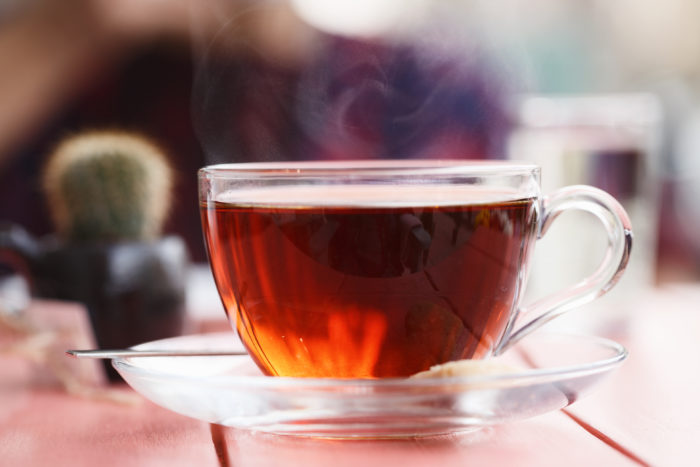Did you know that drinking tea can directly improve the health of your gut? Keep reading to find out more about this simple strategy to improve your gut health!
Gut health is a hot topic today in the holistic wellness community.
There’s currently more information than ever showing that the health of our gut really does affect the health of our entire body.
Everything from the health of your immune system to your weight has been proven to be regulated by the health of your gut.
If you just do a quick Google search for ‘natural ways to support gut health,’ you’ll find almost 90 million results.
It’s easy to get overwhelmed when it comes to digestive health. Believe me, I’ve been there.
But, what if I told you that supporting your gut health could be as simple as drinking a few cups of tea each day?
(Click here to try out the tea that I’ve been loving lately.)
Now, I’m not saying that drinking tea alone will resolve your gut issues.
But, it is a simple, inexpensive, and pleasurable way to provide your gut with some key nutrients to optimize its health.
Before I jump into how tea is beneficial to gut health, let’s look at what makes up a healthy gut in the first place.
Components of a Healthy Gut
We all want a healthy gut. We all know how miserable just a small amount of digestive discomfort can be.
What makes up a robust digestive system can vary from person to person. And what affects one person’s digestion won’t affect another.
How do I know my digestive system is working smoothly? I’m pooping at least once a day. (Sorry, not sorry!) I’m not experiencing bloating, loose stools, constipation, or gas. I can eat freely within my real food template with no significant restrictions. I’m able to get through my workouts without digestive distress. And I can splurge on ice cream or a burger and fries without my digestion tanking the next day.
Having good digestion is a complex process. It involves appropriate secretion of stomach acid and bile, as well as peristaltic movements of your intestines. And believe it or not, interactions from your environment and own brain affect digestion as well. (Ever heard of Pavlov and his dogs? That applies to you too!)
Even with all of these complex processes working together, one of the most important factors of healthy digestion is the health of your gut bacteria.
You’re probably aware that we have billions and trillions of bacteria living in our guts. These beneficial gut bugs work in symbiotic relationship with us to keep our digestion working well in ways we’re only beginning to understand.
Why Gut Bacteria Are Critical to Gut Health
Your gut is home to trillions of bacteria (known as your microbiome) that don’t just take up space. They actually play an integral role in the health of your gut, along with the health of the rest of your body.
Without a robust and healthy microbiome, your gut won’t be functioning at its best.
If your gut bacteria are imbalanced, you may end up suffering from a host of other health issues. Everything from insulin resistance, to inflammation, and depression has been linked to an unhealthy microbiome.
Having healthy and happy gut bacteria affects WAY more than just our digestion. Which is why maintaining adequate levels of the beneficial bugs is so important.
Even if we just focus on just the gut-related effects of having an unhealthy microbiome, the impact is still huge! Any of the following symptoms can be a sign of imbalanced gut bacteria.
- Bloating and gas
- Indigestion and acid reflux
- Food sensitivities
- Constipation or diarrhea
- Chronic bad breath
Healthy gut bacteria support proper digestion by maintaining the integrity of your gut lining, helping you digest certain fibers, and keeping any pathogens that might make you sick at bay.
Now that we’ve looked at why gut health – specifically microbiome health – is so important, you might be wondering what any of this has to do with drinking tea. That’s where polyphenols come in.

What Are Polyphenols?
Polyphenols are naturally occurring compounds found in plants.
There are over 500 different types of these micronutrients. And each one benefits the body in a different way. This is just one more reason to get a large variety of plant foods in your diet!
Polyphenols are actually a type of antioxidant. And we’ve all heard of antioxidants for their health-promoting benefits.
But did you know that in the gut, polyphenols support the growth of beneficial bacteria by acting as a prebiotic?
A prebiotic is a plant fiber that is indigestible by our body but can be digested by the bacteria that reside in our gut. It serves as food for those beneficial gut bugs and keeps them healthy and in appropriate numbers.
One study has shown that a diet high in polyphenols increased the numbers of beneficial bacteria specifically tied to helping prevent leaky gut!
Leaky gut is one of the most common causes of digestive issues among my clients. And eating a diet high in polyphenols is such a simple way to help prevent it.
All plant foods contain some amount of polyphenols. But the highest concentration of these micronutrients is actually found in tea!
(Click here to try out my favorite tea.)
Green tea, black tea, and matcha (a form of green tea) are some of the richest sources of polyphenols you can consume. That’s why these teas can serve as an excellent and delicious supplement to support good gut health.
Tea, Polyphenols, and Gut Health
Tea is going to give you the most “bang for your buck” when it comes to gut supporting polyphenols.
Per serving, black tea contains 197 mg of polyphenols and green tea 173mg. Compare that to the 33mg of polyphenols per serving in broccoli and 149mg in an apple.
So if you’re looking to maximize your consumption of polyphenols, tea is the way to go! Plus it tastes great and is a super relaxing addition to your daily routine.
And if you’re anything like me and need a simple way to support your gut health that fits a busy schedule, including a few cups tea per day is a no brainer!
Besides being one of the most abundant sources of polyphenols, tea and its specific benefits to gut health have also been supported by science.
The regular consumption of tea polyphenols has been shown to improve the number of beneficial gut bugs while limiting the numbers of pathogenic ones.
And since we know how important a healthy balance of gut bacteria is to our overall health, the benefits of drinking tea high in polyphenols is huge.

Tea As an Antioxidant
The polyphenols in tea do so much more than just act as a prebiotic to modulate gut bacteria. The antioxidant properties of these compounds can also be beneficial for supporting a healthy gut.
Antioxidants reduce inflammation. And we all know that inflammation, especially in the gut, is a recipe for disaster.
Would you like to save this post?
Your email address is 100% safe and will never be sent spam.
In rats with inflammatory bowel disease (IBD), consuming green tea was shown to improve diarrhea and other gut symptoms associated with the disease.
Your gut can also become inflamed for reasons way less serious than IBD. Gut inflammation can come from a diet high in processed foods and refined sugars and low in fiber, or from living a high-stress lifestyle.
If you’re experiencing some gut symptoms (like bloating, gas, or reflux) try including some high-quality tea in your routine.
If that still doesn’t seem to help, your next best move is to team up with a qualified health practitioner to get to the root of your gut issues.
Tea As an Antimicrobial
We’ve already looked at how the prebiotic properties of tea polyphenols can support the growth of healthy gut bugs.
But did you know that tea can also act as an antimicrobial to help get rid of bad gut bacteria?
The specific polyphenols in green tea can actually inhibit the growth of pathogenic bacteria in a few ways. These compounds can bind to bacteria cell membranes causing damage, as well as inhibit bacterial enzyme activity.
In other words, the compounds in tea actually kill the bad bacteria in our guts!
Green tea polyphenols have been shown to actually prevent the growth of h pylori. This is the main pathogenic bacteria that can cause stomach ulcers and acid reflux.
And when used both alone or in combination with traditional antibiotics, herbal, green, and black tea were all shown to exhibit antimicrobial effects.
Now, I wouldn’t forgo your doctor’s recommended antibiotic treatment and only use tea if you have a bacterial infection. But, if you’ve been prescribed antibiotics for an infection, it wouldn’t hurt to supplement with high-quality tea for an added antimicrobial boost.
Tea As a Detox Support
Detoxification is far more than lemon water cleanses or the latest detox shake. And even though the Kardashians are pushing their “detox teas”, the concept of tea supporting our body’s detoxification processes isn’t that far fetched.
Our body’s detox organs (mainly the liver and kidneys) are constantly at work to filter out air and water pollution, preservatives in our food, and chemicals in our skincare products and makeup.
Detoxification normally happens just fine on its own. But if you are dealing with digestive issues, you might want to give your body a little extra support.
The gut is the body’s final pathway for elimination of its accumulated toxins. If you’re not pooping regularly, those toxins could just be sitting in your gut getting reabsorbed. The prebiotics in tea can help support regular, healthy bowel movements by feeding the beneficial flora in our gut.
Drinking a few cups of tea every day will not only help support proper digestive function, but it can also aid in the earlier stages of detoxification too.
When it comes to detoxification support, green tea and matcha are the real superstars. The polyphenols in green tea and matcha specifically, known as catechin, directly support liver detox.
By increasing enzyme activity that drives the first two phases of detoxification, this polyphenol enables the body to initiate the removal of stored toxins.
Green tea and matcha also contain a large amount of chlorophyll. Chlorophyll is the pigment that makes these beverages green and offers an array of health benefits when consumed.
When we’re talking about detox and gut support, chlorophyll has been shown to help flush out heavy metals, toxins, and chemicals from the body.
Enjoying a few cups of green tea or high-quality matcha every day can help your body eliminate toxins more effectively, protecting your body from the exposures of everyday life.
PS – Supporting your detox pathways using tea can do more than just improve gut health. Click here to read an article I wrote on how drinking tea can help your hormones too!
Matcha As Your Gut Health Superstar
What makes matcha stand out from other green tea varieties is the sheer quantity of health-promoting compounds found in its leaves.
The main reason matcha has more health benefits than other tea varieties is that its leaves are still growing when harvested. This means that when the leaves are picked, the plant is actively producing compounds like chlorophyll and amino acids to support its own health.
And what supports the health of the plant, supports our health as well!
You’re also consuming the actual tea leaf when you’re drinking matcha. Compare that to the infused water you drink with traditional green tea.
Matcha contains the highest levels of l-theanine (known as nature’s Xanax), catechins, and antioxidants of any tea variety.
And if you’re serious about supporting your gut and detox pathways, high-quality matcha is the way to go!
Here’s an article that has pretty much everything you ever wanted to know about matcha.
And if you want to try out my favorite ceremonial-grade matcha, click here!
My favorite way to prepare matcha for maximum health benefit is with a high-quality almond milk and a teaspoon of Beekeeper’s Naturals Superfood honey.
The Bottom Line on Tea for Gut Health
Tea certainly isn’t the cure-all for your digestive symptoms. But, if you’re looking to give your gut health a boost, tea is a proven worthwhile addition to your routine.
Tea contains some of the largest amounts of health-promoting compounds per serving of anything you could consume. From polyphenols to antioxidants to chlorophyll, tea is a great addition to any healthy lifestyle.
If you’re looking to try some new tea, click here to check out my current favorite! You’ll get up to 20% off your order plus free shipping too!

Image Credit: SouveNEAR [https://store.souvenear.com/]
The Tea I Recommend
Quality matters when it comes to the health-promoting contents of tea. Like when choosing your meats and veggies, choosing high-quality, ethically sourced, organic teas will maximize its health benefits.
Which is why Pique Tea is the only brand I trust to consistently provide tea that will actually support my gut health.
What makes Pique Tea truly unique is its state-of-the-art tea crystals.
The creators of Pique Tea spent thousands of hours finding premium organic ingredients from the best farms around the world. They also developed a patented Cold Brew Crystallization process. It uses low-temperature brewing to lock the maximum level of antioxidants in crystal form.
They also developed a matcha powder that is second-to-none. It’s the best tasting matcha I’ve ever had, with a complex flavor that cuts the bitterness. It’s the only matcha I’ve ever tried that doesn’t taste like grass clippings!!
I enjoy drinking it in the morning while I journal, knowing that I’m maximizing the health benefits I’m getting because of Pique Tea’s high quality standards. It’s a superior quality tea brand and meets the highest level of health criteria.
This unique tea brand:
- Delivers up to 12x the antioxidants of regular tea
- Is triple screened for mycotoxins, pesticides and heavy metals
- Is made from the highest quality, organic, additive-free, tea leaves
- Dissolves in cold or hot water in a matter of seconds
- Is great for travel and when you are on-the-go
If you’re looking for a quick and easy way to integrate more gut healing into your day, Pique Tea is the way to go!
Pro tip: use a programmable kettle and set it at ~160 degrees to get the water to an enjoyable temperature without damaging the tea by adding boiling water.
Now tell me, have you noticed any gut healing benefits from drinking tea? Would you consider including a high-quality tea like Pique into your daily routine to improve gut health? Share your thoughts in the comments below!
This post may contain affiliate links. If you click on a link and make a purchase, I may receive a small commission.


+ show Comments
- Hide Comments
add a comment